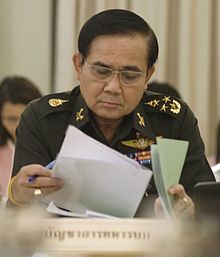Thailand’s military court is being used to process civilian crimes against the crown and state for the first time since the 1970s, writes TYRELL HABERKORN.
Since the 22 May 2014 coup by the National Council or Peace and Order (NCPO), the 12th ‘successful’ (meaning that power was seized) coup since the end of the absolute monarchy on 24 June 1932, I have frequently encountered two erroneous understandings by observers outside the country. The first is that the NCPO is not particularly repressive and the effects of the coup have not been wideranging. The second is that there is no significant opposition to the coup. Both of these observations are incorrect.

The current prime minister, General Prayuth Chan-ocha, is a dictator and Thailand is a military dictatorship. Martial law was declared two days prior to the coup and it remained in force until 1 April 2015. At that time, it was replaced by the use of Article 44 of the temporary constitution, which provides the junta with the power to take any action deemed necessary to preserve order, and then makes it de facto legal.
During dictatorships in the 1950s, 1960s, and 1970s, a similar measure was used extensively for summary detention and execution of those deemed enemies of the state. The military court is being used to process civilian crimes against the crown and state for the first time since the 1970s.
There are significant restrictions on freedom of speech and constant threats and intimidation of students, resource rights activists, journalists, and others. According to the Thai nongovernmental organisation iLaw, there have been at least 690 persons summoned and detained since the coup, 399 arrests, including 144 arrests at peaceful protests. These arrests have resulted in 142 new criminal cases for political crimes, of which more than two-thirds are being processed in the military court. There has been an epidemic of prosecutions for alleged lèse majesté, or insult, defamation, or threat against the king, queen, heir-apparent, or regent. Since the coup, there are known to be at least 47 new cases across the criminal and military courts, including for such crimes as performing theatre plays and writing graffiti in bathrooms.
This misunderstanding about the nature of the coup is then matched by too little attention being paid to the range of protest and dissent against this repression. While a large number of Thai citizens encouraged the soldiers to leave the barracks and support the coup, a range of political actors, including familiar figures such as students, but also others, are dissenting even within this constricted environment.
As they have garnered more supporters, the junta has responded with increasing alarm and violence, most recently trying to criminalise walking.
In particular, Resistant Citizen, a group of intellectuals, workers, and families of victims of earlier political violence, beginning with a Day of Love for Elections carried out on Valentine’s Day, have organised a series of increasingly popular and critical protests bridging clever uses of social media with an adaptation of traditional protest methods to expose the violence of martial law. They have planned and carried out a series of lone protest walks in Bangkok, purposefully pushing the boundaries of martial law in order to expose it as an instrument of repression, not reform. As they have garnered more supporters, the junta has responded with increasing alarm and violence, most recently trying to criminalise walking.

But I want in particular to highlight dissent coming from a far more constricted position: behind the bars of the Central Women’s Prison. Pornthip Munkhong is a 26-year-old activist sentenced to 2.5 years in prison in February 2015 for allegedly insulting the monarchy during the performance of a satirical play, The wolf bride, performed in October 2013.
Like most others accused of violating Article 112, she pleaded guilty, because there was no possibility of an innocent verdict. Beginning in September 2014, she began writing a fable, Little foot, in detention. Prior to her arrest, she conducted theatre workshops for children, and her stated audience for the fable is the group of children with whom she worked. She has written five parts so far, each sent out of the prison to a friend and then published by the independent media site Prachatai. Each part is one page in length, to abide by the permitted length of outgoing letters.
Little foot is a creature of unknown form. The story Pornthip is writing is about his journey on a path in the fading light of one day. We know he leaves home, but not his destination. Because the dark is looming, he must constantly decide whether to choose safety or risk, and strategise how to survive in the challenging terrain.
Similar to the satirical play for which she was imprisoned, the fable too is an allegory. Her audience also includes the adults outside prison who read her fable as it is published, as well as the censors—whom she addresses, in veiled terms, at the beginning of her fifth installment as her first readers— who read each piece of mail and stamp their approval across it before it leaves the prison,.
The reason I chose to highlight Pornthip Munkhong’s fable is that I think, for many, there must be thousands of people amassed in the streets for an action to constitute significant opposition. Just as it is bad to romanticise resistance, so too is it shortsighted to fail to recognise dissent, because our optics are not acute enough to comprehend what is truly repressive, and what is truly resistant. Her fable, her daring to write it, her sense that the censors are part of her audience, is necessary dissent in a time of repression.
Main photo:
Anti-government protests in Bangkok at Rajaprasong Intersection, 22 December 2013 ( Wikimedia Commons).

